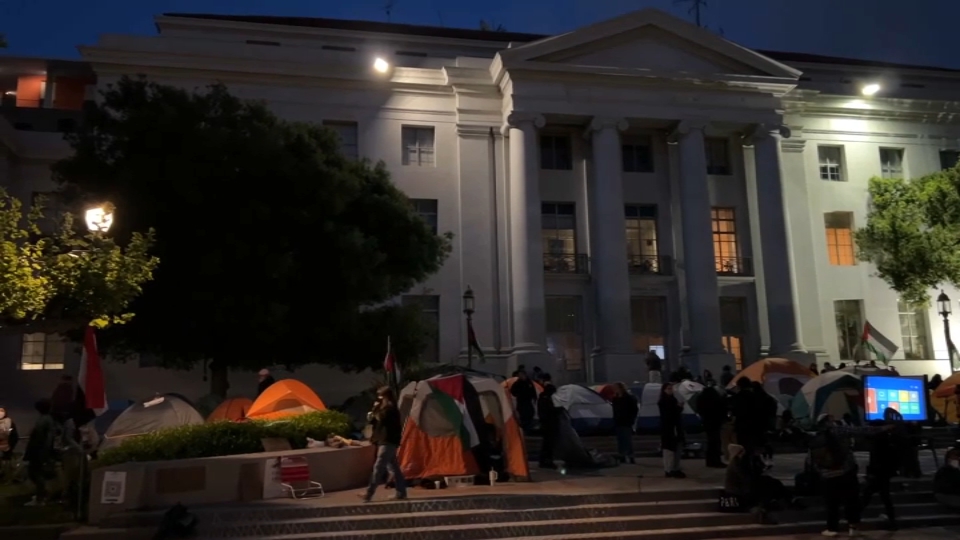A critical piece of video evidence in the domestic violence case against San Francisco Sheriff Ross Mirkarimi was once again the subject of arguments in court today as his trial approaches.
Mirkarimi, 50, pleaded not guilty to domestic violence battery, child endangerment and dissuading a witness in connection with a Dec. 31 incident in prosecutors say he bruised his wife Eliana Lopez's arm during an argument.
The prosecution's key evidence in the case is a 55-second video recorded by the couple's neighbor Ivory Madison on Jan. 1 that reportedly shows Lopez crying, pointing to the bruise and recounting the incident. Prosecutors on Friday filed a motion that included still images from the video.
Lopez has denied the charges against her husband.
After Mirkarimi's attorney Lidia Stiglich on Monday fought to have the video excluded as evidence under the court's hearsay rules, Lopez's attorney Paula Canny argued in a pretrial hearing this morning that the video should be blocked because it was made under the guise of attorney-client privilege.
Canny wrote in a motion filed with the court that Madison's biography on her book-selling website, www.redroom.com, says she is "trained as an attorney ... interned at the California Supreme Court, and served as Law Fellow at Americans United for the Separation of Church and State."
Local
Prosecutors countered that while Madison graduated from law school, she has not passed the bar exam and is not licensed to practice law in California.
Canny argued to Judge Garrett Wong today that Lopez "had a reasonable belief that Ivory Madison was acting as an attorney," noting Madison's biography and that in Venezuela, Lopez's home country, graduating law school is all that is necessary to become an attorney.
"My client could have gone to anyone," she said. "She didn't discuss this with anyone because she wanted confidential legal advice."
In a written declaration by Lopez filed with the court, she said that on Jan. 4, Madison approached her outside her home.
Lopez said Madison "ran up to me and said to me, 'You are going to kill me. I called the police and they made me tell them...' I interrupted her. I was totally shocked and I yelled at Ivory Madison, 'NO, this is wrong. I came to you for legal help. You do not have my permission.'"
Prosecutor Lindsay Hoopes said that every single reference to Madison in statements by Lopez from the video and in emails and texts have identified her as "a neighbor and friend," not an attorney.
Wong denied Canny's motion, saying that while Lopez may be the holder of attorney-client privilege, "the evidence is not being used against her" so the motion lacks standing.
Canny also asked for the case to be dismissed and the district attorney's office to be sanctioned for releasing still images from the video last Friday as part of a filing with the court, citing a 2008 last passed by voters to protect victims' rights to privacy and dignity.
"They knew when they put those photos on that brief, and gave it to the press, that they knew it would go viral," Canny said, noting that the photos have been published by media across the country and internationally.
She said the images were released "as an attempt to coerce (Lopez) into testifying" in the trial, saying prosecutors are "so out of their mind to get Ross Mirkarimi that they trampled my client's rights."
Hoopes argued that the photos were necessary to show Lopez's emotional state the day after the incident.
The 2008 law, known as Marsy's Law, "was not intended to allow victims of crimes to affect how the people bring their case," she said.
Wong also denied that motion by Canny, as well as a third motion arguing that Lopez's phone records should be excluded from evidence because she was not notified that they were being subpoenaed.
Canny said outside of court after this morning's hearing that she plans to file an appeal of Wong's rulings on Thursday.
The case is returning to court this afternoon, when potential jurors will be filling out questionnaires and meeting with the judge and attorneys for an orientation.
Court spokeswoman Ann Donlan said there are about 200 people in the pool of potential jurors.
Jury selection will then begin on Monday for the trial, which is expected to last about two weeks, Donlan said.
Bay CIty News



